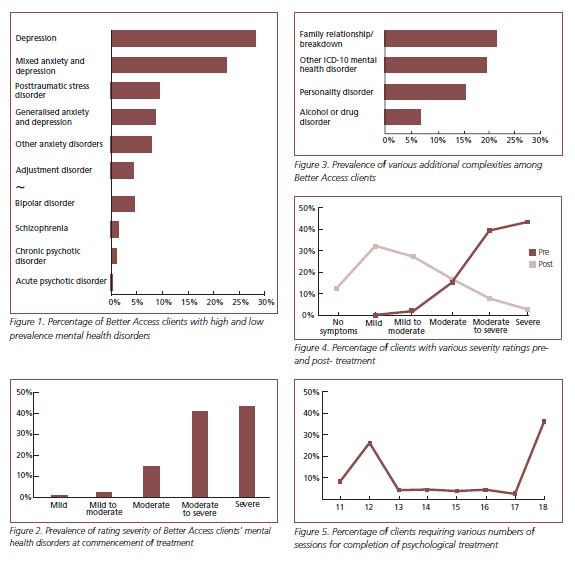The 2011 Federal Budget announced cuts to the Better Access initiative which will be operative from 1 November 2011, involving a reduction in the annual maximum allowance of sessions of psychological treatment from 18 to 10, with no ‘exceptional circumstance’ arrangements enabling additional sessions. The Government has stated that the cuts to Better Access equate to 13 per cent of people treated by psychologists who are seen for more than 10 sessions, which on Medicare Australia session data equates to over 87,000 people per year who would be affected by the cuts. The Government only has Medicare session data to inform the decisions that are made, and these data do not provide information on the nature and severity of the mental health disorders of Better Access clients who will be affected by the cuts.
To support the campaign against the reduction in the number of allowable sessions, the APS undertook an audit survey of clients seen by psychologists in 2010, gathering data on the type and severity of mental health disorders of clients seen for more than 10 sessions in an episode of treatment. APS members were invited to participate in the online survey and 1,182 psychologists provided data on a large sample of 9,900 Better Access clients. I would like to take this opportunity to thank all members who so readily participated in the audit survey and have therefore significantly contributed to the APS advocacy campaign.
The survey requested information from the treating psychologist on the nature of each client’s mental health disorder, the presence of additional complexities in the presentation, the severity of presentation at the commencement and conclusion of treatment, and the number of sessions of treatment required. The key findings of the survey are presented below.
1. The vast majority of Better Access clients who required more than 10 sessions of psychological treatment had moderate to severe high prevalence mental health disorders involving depression and anxiety disorders, which were frequently complicated by comorbidities.
- 81% of Better Access clients requiring more than 10 sessions had an ICD-10 mental disorder involving depression and/or anxiety disorders (i.e., a high prevalence disorder; see Figure 1 on opposite page).
- Only a very small number of clients had a low prevalence disorder – 2% had schizophrenia, 2% had another psychotic disorder and 5% had a diagnosis of bipolar disorder (Figure 1). At the commencement of treatment, 8 4% of clients were rated by the treating psychologist as having a moderate to severe (41%) or severe presentation (43%), and only 0.2% were rated as having a mild presentation (Figure 2).
- 65% of clients had additional complexities to their presentations, including 43% with comorbidity involving another ICD-10 mental disorder, drug or alcohol disorder or a personality disorder, and 22% with co-occurring family/relationship breakdown (Figure 3).
2. These clients with moderate to severe high prevalence disorders who required more than 10 sessions demonstrated significant improvement, indicating that they received effective psychological treatment.
- At the commencement of the episode of treatment, 84% were rated by the treating psychologist as having a moderate to severe or severe presentation and only 0.2% were rated as having a mild presentation (Figure 4).
- At the conclusion of treatment, 43% were rated as having no residual symptoms (10%) or a mild presentation (33%), while only 3% retained a severe presentation (Figure 4).
3. Up to 18 sessions of psychological treatment were required by clients with moderate to severe high prevalence disorders to achieve these effective outcomes.
- 37% of clients required 11 or 12 sessions to achieve an effective treatment outcome (Figure 5).
- 37% of clients required the additional 6 sessions under exceptional circumstances (to a maximum of 18 sessions) to achieve an effective treatment outcome (Figure 5).
Conclusions and ongoing APS advocacy
The APS audit survey of nearly 10,000 clients who required more than 10 sessions of treatment under Better Access during 2010 shows that the vast majority had moderate to severe or severe mental health disorders involving depression and anxiety disorders, and that they received effective psychological treatment. These people would be denied the additional sessions of psychological care required for effective treatment under the Better Access initiative under the funding cuts. The vast majority of these people would also be denied access to public sector mental health services as they have high prevalence disorders and are not necessarily in need of team-based care.
The Government has stated that people affected by the cuts can be seen under the Access To Allied Psychological Services (ATAPS) program run through the Divisions of General Practice, but this is not a viable referral option. There is simply not enough funding in ATAPS to provide services for anything like 87,000 additional people per annum.
The APS advocacy campaign against the cuts to the Better Access initiative has been significantly strengthened by the impressive evidence provided through the audit survey. The results of the APS survey showing the impact of the funding cuts on mental health consumers have been presented in formal communications with the Prime Minister, Minister for Health and Ageing, and Minister for Mental Health, discussions with the Ministers’ advisors and senior health bureaucrats, advocacy with Senators, media releases and media interviews. The APS sincerely hopes this demonstration of the needs of those with serious mental health disorders who are referred to psychologists for effective treatment under Better Access will be heeded.
